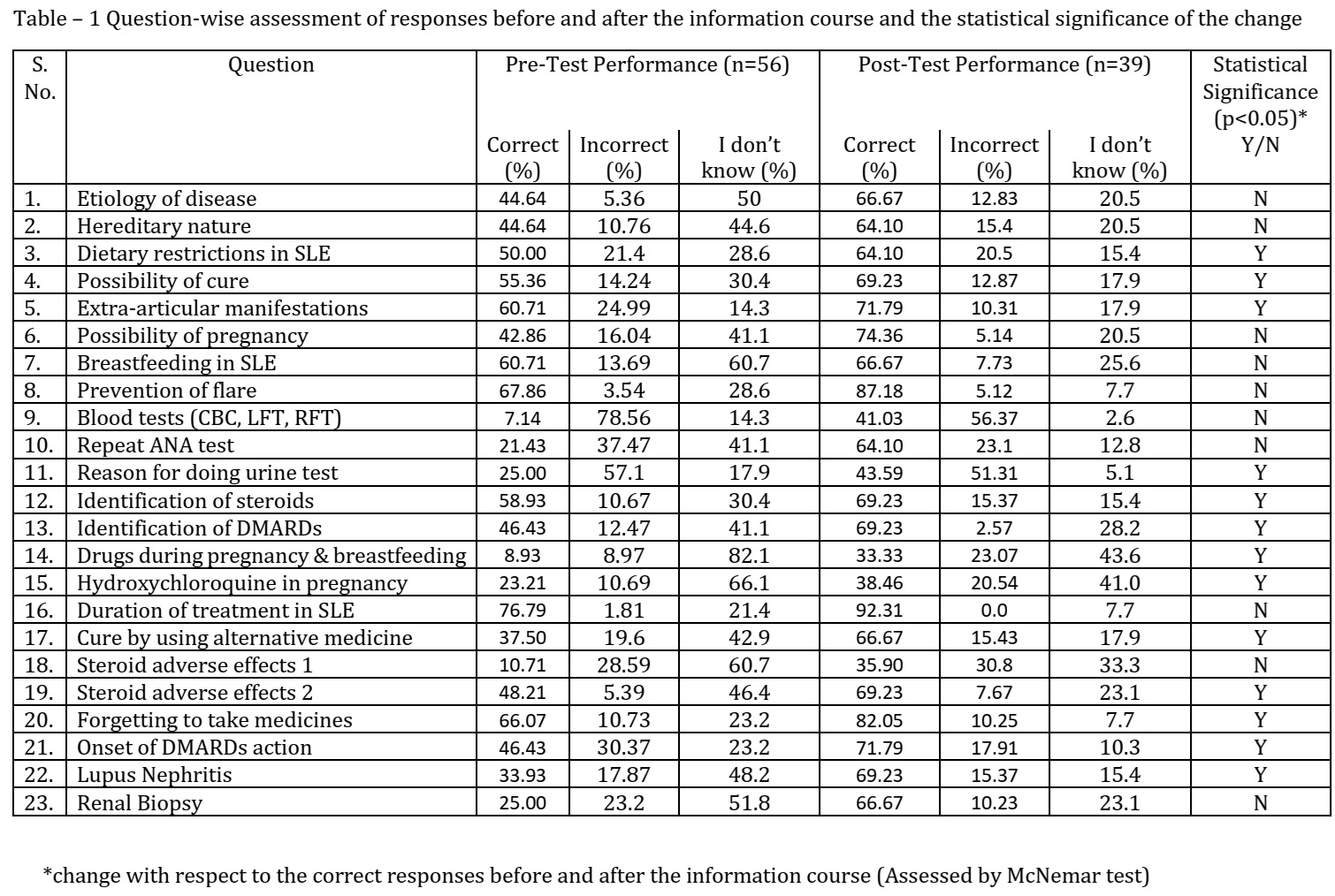Session Information
Date: Sunday, October 26, 2025
Title: (0593–0640) Systemic Lupus Erythematosus – Diagnosis, Manifestations, & Outcomes Poster I
Session Type: Poster Session A
Session Time: 10:30AM-12:30PM
Background/Purpose: Long-term outcomes in rheumatic diseases can be improved by improving patients’ knowledge, beliefs and perception about their disease. However, there is a lack of tools/instruments in Systemic Lupus Erythematosus (SLE) to 1. objectively assess patients’ knowledge in various domains & 2. To assess the impact of a patient education program.The aim of the study was to develop, validate and assess the performance of a self-prepared questionnaire for assessing patients’ knowledge about their disease and to use this tool to assess the impact of an information course in improving the above-mentioned elements among patients.
Methods: A self-prepared questionnaire (Hindi/English) containing 23 multiple choice or true-false type questions with single correct answer assessing patients’ knowledge about SLE in 3 domains (a. etiology, disease process, signs & symptoms b. drug therapy & monitoring c. role of investigations in disease diagnosis and monitoring) was prepared. All questions had an item-level content validity index (I-CVI) of at least 0.9. The scale-level content validity index based on the universal agreement method (S-CVI/UA) was 0.8 for the whole questionnaire as assessed by 6 experts. All questions had an option of ‘I don’t know’ which would prevent patients from guessing the answer from the available options. Each question was given a score of 1 if answered correctly. The questionnaire was applied 3 times: at baseline, immediately after an information course to see the immediate impact and after 6 months to see the retention of the information. Information on demographic features and socio-economic status was also collected. Frequency data were compared using McNemar test for paired nominal data & kappa statistics for ordinal data. Student’s paired t-test was used for comparison of mean scores to see the impact. A p-value< 0.5 was considered significant.
Results: At baseline, the questionnaire was applied to 56 patients with SLE (F:M=54:2; median age 29(16-53) years) and the median(range) score was 10(2-19) (Table–1). Among them, 39 patients attended the information course. The option ‘I don’t know’ was exercised 509 times (39.51%) before the information course which reduced to 169 (18.84%) times after the course and 108 (13.04%) times at 6 months. After the information course, median score increased from 10(2-19) to 17(0-23) (p< 0.001) which was irrespective of the socio-economic classes and education status of the patients (Figure-1). A total of 13 questions recorded a higher number of correct responses as compared to baseline and this increase was significant for all 13 questions (Table–1). Upon re-administering the questionnaire after 6 months, 36 patients out of 39 responded. The median score 16(0-23) of the questionnaire (n=36) remained significantly higher (p< 0.001) as compared to baseline score. Eight out of 23 questions achieved statistical significance (Table–2).
Conclusion: Indian patients with SLE have a poor knowledge base which can be improved by implementing short information courses. The information course was effective across the socio-economic classes and educational status and the information was retained at 6th month without any reinforcement course.
 Table – 1 Question-wise assessment of responses before and after the information course and the statistical significance of the change
Table – 1 Question-wise assessment of responses before and after the information course and the statistical significance of the change
.jpg) Table – 2 Question-wise assessment of responses before the information course and after 6 months with the statistical significance of the change
Table – 2 Question-wise assessment of responses before the information course and after 6 months with the statistical significance of the change
To cite this abstract in AMA style:
Gupta R, Goswami R, Mohan A. Development, Validation and Performance of a Patient Knowledge Assessment Tool for Assessing the Immediate and Short-term Impact of an Information Course in Systemic Lupus Erythematosus [abstract]. Arthritis Rheumatol. 2025; 77 (suppl 9). https://acrabstracts.org/abstract/development-validation-and-performance-of-a-patient-knowledge-assessment-tool-for-assessing-the-immediate-and-short-term-impact-of-an-information-course-in-systemic-lupus-erythematosus/. Accessed .« Back to ACR Convergence 2025
ACR Meeting Abstracts - https://acrabstracts.org/abstract/development-validation-and-performance-of-a-patient-knowledge-assessment-tool-for-assessing-the-immediate-and-short-term-impact-of-an-information-course-in-systemic-lupus-erythematosus/
